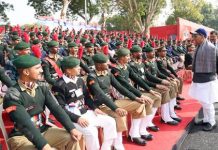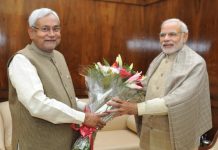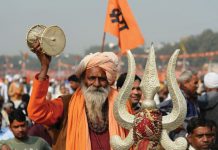Considering the deletions made in class 12 political science text books, it must be said that history and historical facts are now getting camouflaged or covered-up or quite simply white washed! By Humra Quraishi

Don’t let history and historical facts be changed !
Writing this in the context of the fact that several deletions have been made in the NCERT-published class 12 political science text books. Not just vital portions were deleted which carried details to the Babri Masjid demolition-cum-destruction on 6 December 1992, but even references to the Rath Yatra led by L.K Advani and the kar sevaks – the destroyers of the Babri Masjid, or any of the details to the Gujarat Riots of 2002. Not to overlook the fact that the very word Masjid has been dropped from Babri Masjid! Instead, has come up another term for it- Three Domed Structure!
Even history is not spared! Even the crucial term – Masjid – replaced! History and historical facts are now getting camouflaged or covered-up or quite simply white washed! This is a very serious matter and should be a matter of great concern to the citizens of the country.
As I have been writing, on earlier occasions too, RSS-affiliated Shiksha Sanskriti Utthan Nyas, headed by Dina Nath Batra, had sent a list of recommendations to the National Council of Educational Research and Training (NCERT) demanding a host of changes in its textbooks. Batra asked the NCERT to remove English, Urdu, and Arabic words, a poem by the revolutionary poet Pash and a couplet by Mirza Ghalib, the thoughts of Rabindranath Tagore, extracts from painter MF Husain’s autobiography… Batra also wanted references to the Mughal emperors as “benevolent”, the BJP as a “Hindu” party, the National Conference as “secular”, an apology tendered by former prime minister Manmohan Singh over the 1984 riots, and a sentence that “nearly 2,000 Muslims were killed in Gujarat in 2002” to be all removed! News reports also had stated that Nyas objected to the facts that the Class 11 political science textbook mentions the “massive majority of Congress in 1984” but “does not present the 1977 election details”, the Class 12 political science textbook “terms National Conference of J&K a secular organization”, and the Class 10 English textbook “places nationalism against other ideals” as “an attempt has been made to show a rift between nationality and humanity by citing thoughts of Rabindranath Tagore”. It also wanted the Hindi textbooks to mention that the medieval Sufi mystic Amir Khusrau “increased the rift between Hindus and Muslims.”
Nyas had on earlier occasions demanded the removal of AK Ramanujan’s essay “Three Hundred Ramayanas: Five Examples” and “Three Thoughts on Translation” from the under-graduate syllabus of the University of Delhi, and went to court demanding that Wendy Doniger’s “The Hindus” not be sold in India. Their demands were fulfilled! Ramanujan’s essay was removed from DU’s reading list, and Penguin India, the publisher of Doniger’s book, pulled it from circulation.
Relevant to mention here that in 2014, government schools in Gujarat were given six textbooks written by Batra as “supplementary literature” that claimed cars were invented in ancient India and told children to draw an ‘enlarged nation’ to include countries including Pakistan, Bangladesh and Afghanistan.
Not to overlook the distortion of the very meaning of certain words like ‘Roza’ (Muslims’ observe Roza or fast during the month of Ramzan) published in text books taught in Gujarat schools. And in the summer of 2017, the ICSE board’s class VI textbook circulated in schools across India ‘blamed’ mosques and Azaan for causing noise pollution! A chapter on noise pollution, in the book published by Selina Publishers, focused on the sources that cause noise pollution. Besides images of trains, cars, planes as the usual sources of noise pollution, there was also an image of a man shutting his ears in frustration right in front of a mosque! Quite obviously relaying that the azaan is a source of noise pollution!
Dismal employment scenario
The grim fact is that there seems to be no jobs for hundreds and thousands of our unemployed! And none seem in sight. So where do our unemployed go! Either sit starving here in their country or rush towards foreign lands. If only there were adequate employment avenues open for Indians in their own country, then perhaps, none would move out.
Forty Indians lay dead in the devastating fire in Kuwait. Before that came in reports of at least two Indians killed in Ukraine while fighting for the Russian army. Till date, no feedback on those Indians who’d left for Israel, seeking employment, even after being fully aware of what the military might of Israel is capable of unleashing. The ongoing killings of the Palestinians by the Israeli forces are a chilling reminder of the unthinkable levels and magnitude of sheer havoc and severe forms of violence!
If only it could rain!
Sitting in this unbearable heat and dust, I’m reminded of this couple, Asha and Vishwanath Sahai. I had been meeting them at the home of the Dhrupad singers/renderers – Dagars…Both were closely associated with Ustad Nasir Zahiruddin Dagar (popularly called Bamaji). Vishwanath recounted this “unique experience” to me when I was writing my book on the Dagars.

“One summer evening, when the family had to be in Jaipur and Bamaji had to stay back, Asha and I were sitting with him after my class (taleem) when we requested him to sing as it had been a while, he suggested we wait for it until the following day. He would always smile and say “artist kay mood ki baat hai”. Patience in any case is a virtue for any disciple regardless of the discipline. We were always delighted to hear him, as it took us to a meditative space that I found difficult to be in on my own. It was pure bliss…Came the next day and we were in his presence on that quiet hot evening – even the birds were not stirring. Bamaji was in his room and nanhay mamu (Bamaji’s cousin) also happened to be sitting outside at that time…Possibly, as a reward for the patience and the severity of the weather, he started the alaap part of ‘Miyan-ki-Malhar’. It continued for about an hour, when he suddenly stopped and said, “I feel we can continue this on another day, aaj kuch aur sunaa-tay hain”.
Because of the break, I went out to the living room where nanhay mamu observed that we had a mini shower and it had become a bit bearable. I could not believe it, until I went out and saw for myself that it had indeed rained briefly!
One can only say that he stopped ‘Miyan-ki-Malhar’ as he did not want us to feel that he was responsible for the showers, in any way!”












